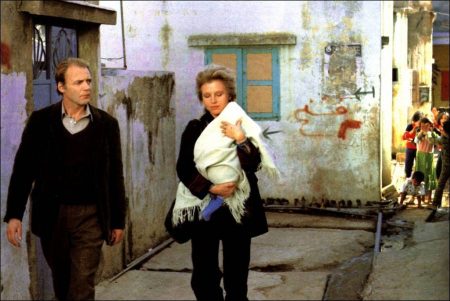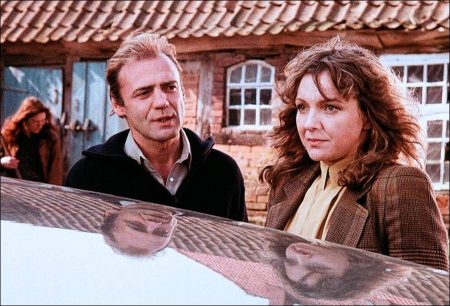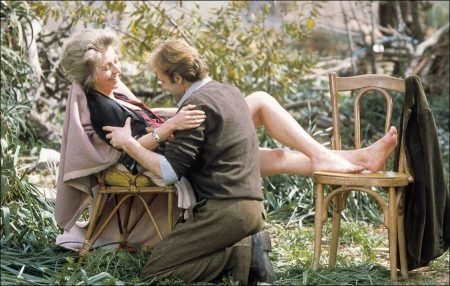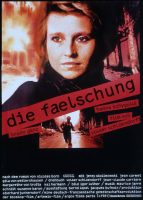Circle of Deceit movie storyline. Shot on location in the still smoldering streets of Beirut, Circle of Deceit is a film of riveting tension and passionate eloquence. Director Volker Schlöndorff (The Legend of Rita, The Ogre, The Tin Drum) combines war film verve, documentary immediacy to yield a violent yet character-rich film that’s both politically charged and personally moving.
Grateful for a respite from his imploding marriage, Hamburg newspaperman Georg (Bruno Ganz – Luther, Wings of Desire) arrives in civil war-torn Beirut to chronicle the bloody Lebanese war. Inside a shell-pitted hotel, Georg and his photographer colleague Hoffman (cult director Jerzy Skolimowski – Deep End, The Shout) join a cynical international coterie of competitive fellow journalists.
Outside, they take their lives in their own hands, dodging both Christian and Palestinian bullets and conducting interviews that are always just a trigger pull away from becoming executions. When Georg’s affair with a beautiful German ex-pat widow (Fassbinder icon Hanna Schygulla) evolves into something more than an indulgence, Beirut’s bloody whirlpool of brutality threatens to claim Georg’s neutrality and his civilized self-control.
Without taking sides or pulling punches, Schlöndorff’s meticulous direction renders both the lethal chaos of urban warfare and the moral tug-of-war of modern Mid-East politics with equally sensitive precision. Probing an ethical minefield of journalism, exploitation, war, and murder, Circle of Deceit is hauntingly compassionate, shockingly realistic, and “a superior film in every respect.”
Circle of Deceit (German title: Die Fälschung; French title: Le Faussaire) is an anti-war film directed by Volker Schlöndorff and internationally released in 1981. An international co-production, it was an adaptation of Nicolas Born’s novel of the same name, which had appeared in 1979. The film follows a German journalist sent to Beirut to report on the Lebanese Civil War, which had begun in 1975.
The film was shot on location in Beirut. The Lebanese Civil War, which began in 1975, would continue until 1990. The New York Times remarked that it was “filmed in 1980 under remarkable conditions: with its crew confined to “safe” portions of Beirut while the fighting went on elsewhere, but with ubiquitous evidence of real warfare everywhere.”
The film was nominated for the César Award for Best Foreign Film in 1981. Jerzy Skolimowski won the Best Supporting Actor Deutscher Filmpreis in 1982, for his role as the war photographer Hoffmann. The original soundtrack music composed by Maurice Jarre for Le Faussaire was released on CD in 2013 by Canadian label Disques Cinemusique. More information here.[permanent dead link]
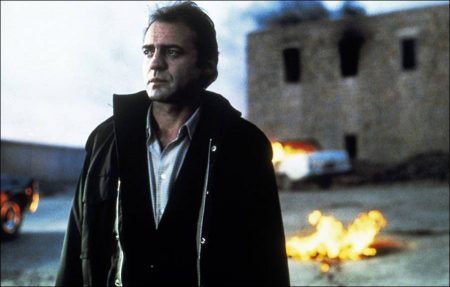
Film Review for Circle of Deceit
Volker Schlöndorff’s humanist Circle of Deceit charts the many moral quandaries faced by journalist Georg Laschen (Bruno Ganz) when he’s sent to Beirut to catalog the outbreak of the Lebanese civil war. Viciously absorbed into the unpredictable chaos that erupts around him, Georg comes to question his subjective approach to the war while trying to put an end to his devastated relationship with his wife (Gila von Weitershausen) back home and negotiate the parasitic journalists who soullessly trade in images of the dead.
Not unlike Rainer Werner Fassbinder’s Pioneers in Ingolstadt, which also starred Hanna Schygulla, Circle of Deceit is troublesomely hung up on a metaphoric love-is-war dialectic that works for Schlöndorff more than it did for Fassbinder because the approach here is considerably more folkloric. Maurice Jarr’s sinister, almost childlike score is a work of subversive genius that exaggerates the rampant cynicism and hypocrisy the film simultaneously embodies and parades throughout its 108 minutes.
“A very good photographer. He only sees what he sees. He leaves the doubting to me,” says Georg of his photographer friend, Hoffmann (Jerzy Skolimowski), a man so unmoved by even the most gruesome deaths that he will only record it if it coddles his predetermined notions of aesthetic truth. However glib Georg’s marital problems are in comparison to the horrors he experiences, Schlöndorff is valiantly fixated on the logic of wars—that is, their unexplained beginnings and uncertain endings.
A Hollywood production would have freed Georg by story’s end; here, he returns to his wife more confused than ever. The film’s rain-drenched finale ravishingly evokes the horror of being trapped in a situation with no apparent way out.
Circle of Deceit (1981)
Directed by: Volker Schlöndorff
Starring: Bruno Ganz, Hanna Schygulla, Jerzy Skolimowski, Gila von Weitershausen, Jean Carmet, Peter Martin Urtel, John Munro, Josette Khalil, Sarah Salem, Ghassan Mattar, Magnia Fakhoury
Screenplay by: Volker Schlöndorff, Jean-Claude Carrière, Margarethe von Trotta, Kai Hermann
Production Design by: Richard Bolz, Fayez Hijazi
Cinematography by: Igor Luther
Film Editing by: Suzanne Baron
Costume Design by: Dagmar Niefind
Set Decoration by: Jacques Bufnoir, Bernd Lepel
Art Direction by: Alexandre Riachi, Tannous Zougheib
Music by: Maurice Jarre
MPAA Rating: None.
Distributed by: Kino International
Release Date: October 15, 1981 (West Germany), October 28, 1981 (France)
Visits: 111
